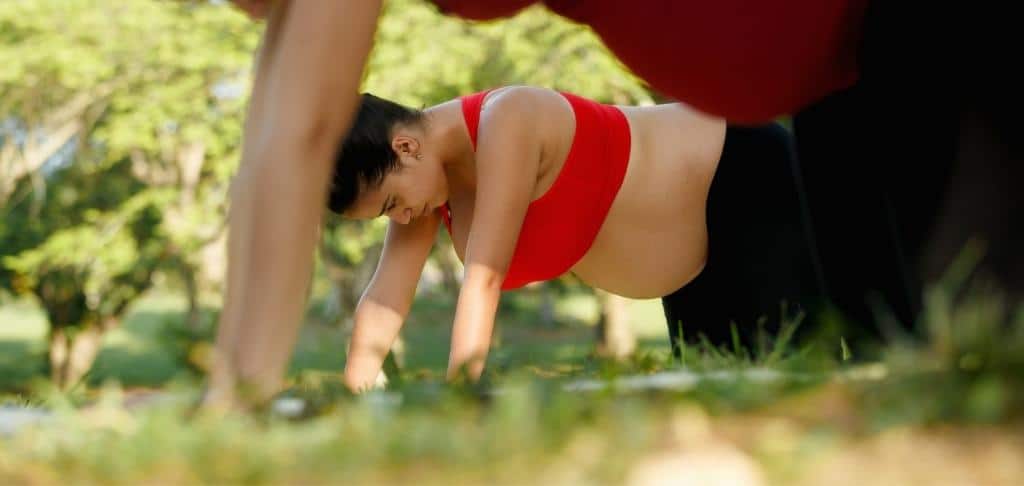
Pop culture and memes like to make light of moms who accidentally pee when they sneeze, jump, or pick things up. But the truth is, postpartum incontinence is a frustrating reality for a surprising number of women.
Because urinary incontinence is such a common concern I hear among my female patients, I’d like to spend some time talking about (and hopefully reducing the stigma surrounding) this important issue: what it is, who’s affected, and how working with a physical therapist who specializes in pelvic floor dysfunction can help.
What Is Incontinence?
Incontinence is the inability to control your bladder and/or bowel movements. If you’re a mom with urinary incontinence, you might notice things such as:
- Letting out a little pee when you do things that exert pressure on your bladder, such as sneezing, laughing, or jumping
- Feeling like you have to go a lot
- Feeling like you have to go urgently or suddenly
As we’ll discuss a bit more in the next section, postpartum urinary incontinence (and even fecal incontinence) is often related to pelvic floor dysfunction. So, in addition to accidental leakage, you might also experience other symptoms such as pelvic pain, constipation, and abdominal separation.
Why Does Pregnancy Cause Incontinence in Some Women?
Anywhere from one-third to over one-half of pregnant women experience some amount of urinary incontinence. Incontinence also persists well after labor and delivery for many new moms.
One study published earlier this year in the European Journal of Obstetrics & Gynecology and Reproductive Biology: X found that 1 in 6 women still experience urinary incontinence at least three months after giving birth.
Why is it so common? Let’s think about the mechanics of a “baby bump.” As a baby grows in the womb, the bladder (which sits right below the uterus) gets compressed. Because of this, the bladder has less room to expand, which can lead to a frequent sense of urgency and make it more difficult for a woman to control her urine.
But it’s not just the bump. Structural and hormonal changes in pregnancy, in addition to labor and delivery itself, can cause stretch out and weaken a woman’s pelvic floor muscles. These muscles are essential for holding the pelvic organs in place and controlling the release of urine and stool. So, if these muscles become damaged or strained, incontinence and other issues like pelvic organ prolapse or pelvic pain can show up.
Why Seeing a Physical Therapist During Pregnancy Can Help Prevent Incontinence
Not everyone who gets pregnant will experience urinary incontinence, but certain factors like having a history of urinary tract infections or previous pregnancies may increase your risk.
Of course, if you’re experiencing incontinence during or after pregnancy, then statistics aren’t as important to you as finding meaningful solutions! Here’s where physical therapy comes into play.
Pelvic floor physical therapy has been shown to help prevent and treat urinary incontinence. This type of care is provided by physical therapists who specialize in pelvic floor health and have advanced training in the diagnosis, treatment, and prevention of conditions related to dysfunction of the pelvic floor muscles.
At PhysioFit, our pelvic floor physical therapists work with a wide range of women looking for relief from urinary incontinence following pregnancy. Relying on years of clinical experience and decades of scientific research, we create comprehensive and customized treatment plans that help:
- Restore the strength, coordination, and alignment of pelvic floor muscles
- Alleviate symptoms
- Prevent symptom recurrence
If you see a physical therapist for pelvic floor dysfunction, expect a range of services that will address your body’s particular needs—including manual therapy, biofeedback training, exercises and stretches, postural awareness techniques, and more.
Ready to See How PT Can Help You Put an End to Your Incontinence?
Whether you’re a new mom or have been a mom for years now, postpartum incontinence and other signs of pelvic floor dysfunction can really get in the way of your day!
If you’re looking for a Los Altos pelvic floor physical therapist who can help you find lasting solutions, call or text PhysioFit Physical Therapy and Wellness now at (650) 947-8500 to schedule an appointment.
Free Guide: “10 Things You Were Never Told About Your Pregenant & Post-Baby Body.”
 ABOUT THE AUTHOR
ABOUT THE AUTHOR
Kim Gladfelter, MPT, OCS, FAAOMPT
Women's Health Physical Therapy Specialist at PhysioFit Physical Therapy & Wellness
Kim Gladfelter is a physical therapist, Pilates instructor, educator, author, and co-founder of PhysioFit Physical Therapy & Wellness. She is known as a keen, well-rounded expert of healing through movement and women’s health specialist in the Silicon Valley area.
Kim has helped men and women of all ages to stay active and feel their best. She also writes about managing pain in her health columns, blogs and the local Los Altos Town Crier newspaper as well as reaches out to the local community, support groups, schools, libraries, and sports centers to advise and educate on body awareness and therapeutic exercise.

 Los Altos, CA
Los Altos, CA

